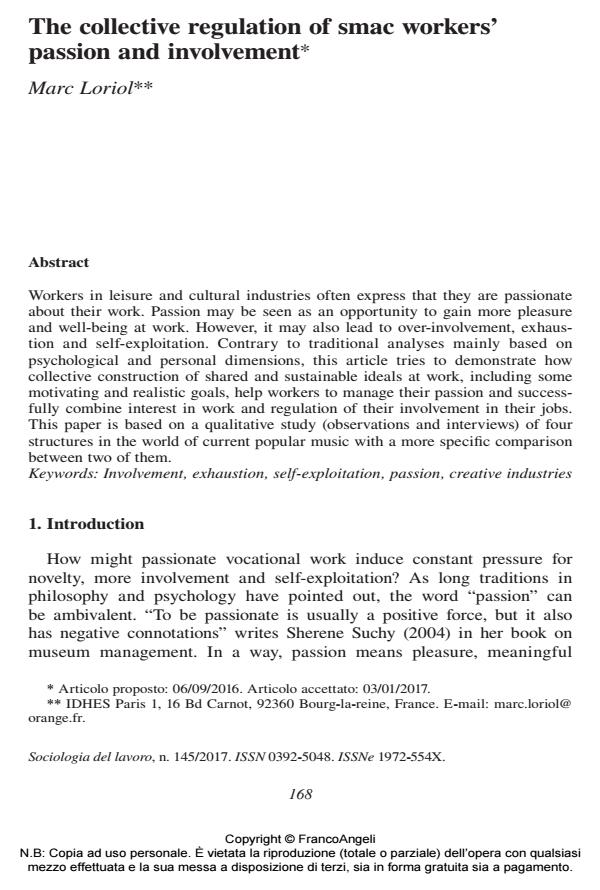The collective regulation of smac workers’ passion and involvement
Journal title SOCIOLOGIA DEL LAVORO
Author/s Marc Loriol
Publishing Year 2017 Issue 2017/145
Language English Pages 16 P. 168-183 File size 106 KB
DOI 10.3280/SL2017-145010
DOI is like a bar code for intellectual property: to have more infomation
click here
Below, you can see the article first page
If you want to buy this article in PDF format, you can do it, following the instructions to buy download credits

FrancoAngeli is member of Publishers International Linking Association, Inc (PILA), a not-for-profit association which run the CrossRef service enabling links to and from online scholarly content.
Workers in leisure and cultural industries often express that they are passionate about their work. Passion may be seen as an opportunity to gain more pleasure and well-being at work. However, it may also lead to over-involvement, exhaustion and self-exploitation. Contrary to traditional analyses mainly based on psychological and personal dimensions, this article tries to demonstrate how collective construction of shared and sustainable ideals at work, including some motivating and realistic goals, help workers to manage their passion and successfully combine interest in work and regulation of their involvement in their jobs. This paper is based on a qualitative study (observations and interviews) of four structures in the world of current popular music with a more specific comparison between two of them.
Keywords: Involvement, exhaustion, self-exploitation, passion, creative industries
- Brandl E. (2009). L’ambivalence du rock: entre subversion et subvention. Une enquete sur l’institutionnalisation des musiques populaires, Paris: L’Harmattan.
- Busso S., Rivetti P. (2014). What’s Love Got to Do with it? Precarious Academic Labour Forces and the Role of Passion in Italian Universities. Recherches sociologiques et anthropologiques, 45, 2, --http://rsa.revues.org/1243.
- Clot Y. (2010). Le travail a coeur. Paris: La Découverte.
- Durkheim E. (1897). Le suicide. Etude de sociologie, Paris: PUF.
- Gautier A. (2009). Les lieux associatifs de musiques actuelles: régulation hybride et changement institutionnel. In: La gouvernance des associations, Toulouse: Eres: 173-201.
- Hesmondhalgh D., Baker S. (2011). Creative labour: Media work in three cultural industries. London: Routledge.
- Le Rendu-Lizée C. (2005). Quelles formes d’implication dans les lieux de Musiques Actuelles et Amplifiées? Volume!, 4, 2: 25-40.
- Linhart D. (2009). Travailler sans les autres?. Paris: Seuil.
- Loriol M. (2012). La construction du social. Paris: PU Rennes.
- Loriol M. (2015). Collective Forms of Coping and the Social Construction of Work Stress among Industrial Workers and Police Officers in France. Theory & Psychology, 26(1): 112-129. DOI: 10.1177/0959354316649063
- Loriol M., Leroux N. (2015). Le travail Passionne. Toulouse: Eres.
- Marzano M. (2004). Travail compulsif et effacement de la subjectivité: l’hyperactivité comme fuite. Travailler, 11(1): 9-23.
- McRobbie A. (2015). Be Creative: Making a Living in the New Culture Industries, London: Polity.
- Morini C., Carls K., Armano E. (2014). Precarious Passion or Passionate Precariousness? Narratives from co-research in Journalism and Editing. Recherches sociologiques et anthropologiques, 45, 2, --http://rsa.revues.
- org/1264. Murgia A. (2012). Stories of Gender. Hegemony and Resistance in Temporary Jobs. In: Knauss S., Wobbeand T., Covi G., eds., Gendered Ways of Knowing in Science. FBK Press: 117-196.
- Reynaud J.-D. (1997). Les regles du jeu. L’action collective et la regulation sociale. Paris: Armand Colin.
- Roth S. (2014). The Paradoxes of Aid Work: Passionate Professionals. London: Routledge, Humanitarian Studies.
- Suchy S. (2004). Leading with Passion: Change Management in the 21st-century Museum. Sydney: Alta Mira.
- Vallerand R.J., Houlfort N., Forest J. (2014). Passion for work: Determinants and outcomes. In: Gagné M., ed., The Oxford Handbook of Work Engagement, Motivation, and Self-Determination Theory. Oxford: Oxford University Press: 85-105.
- Vendramin P. (2004). Le travail au singulier. Paris: l’Harmattan.
- Wrzesniewski A., Dutto J.E. (2001). Crafting a job: Revisioning employees as active crafters of their work. Academy of Management Review, 26(2): 179-201.
- Fragilisation de la définition collective du travail bien fait… et emprise des indicateurs d’activité Marc Loriol, in Nouvelle revue de psychosociologie /2020 pp.63
DOI: 10.3917/nrp.029.0063 - Stress and Suffering at Work Marc Loriol, pp.197 (ISBN:978-3-030-05875-3)
- Pasión por el Trabajo: Evidencias de Validez Discriminante, Predictiva e Incremental Solana Salessi, Alicia Omar, in Psicologia: Ciência e Profissão /2018 pp.522
DOI: 10.1590/1982-37030004752017
Marc Loriol, The collective regulation of smac workers’ passion and involvement in "SOCIOLOGIA DEL LAVORO " 145/2017, pp 168-183, DOI: 10.3280/SL2017-145010